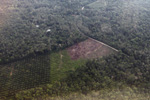
Illegally felled rainforest tree in Gunung Palang National Park in Indonesian Borneo. Photo by: Rhett A. Butler.
Following Japan’s devastating earthquake and tsunami, it needs to rebuild and do so the battered nation has already turned to a neighbor, Indonesia, for timber. However, the Environmental Investigation Agency (EIA) and Indonesian NGO, Telapak, warn that much of the timber that reaches Japan’s shores from Indonesia could be illegally logged from rainforests, unless Japan pledges to only purchase legally-certified wood under Indonesia’s new assurance system.
Less than a year old, Indonesia assurance system, Sistem Verifikasi Legalitas Kayu (SVLK), was created as apart of a Voluntary Partnership Agreement (VPA) with the EU in order to keep illegally logged wood out of EU markets.
Activist Mardi Minangsari of Telepak called this an “opportunity to turn a tragic event into something positive by supporting legally sourced products that Japan can use to rebuild its devastated communities.”
According to the press release, Japan is pursuing two million sheets of plywood from Indonesia.
Faith Doherty, an activist with EIA, said this also gives Japan a chance to kick-start toughening its own regulations relating to importing illegally logged timber from abroad. An issue that the US and EU have recently taken on.
“This is a golden opportunity for Japan to create a system of legality to compliment the Indonesian SVLK,” says Doherty.
Even before its tragic disaster, Japan was the world’s number one importer of wood chips and plywood and the second largest importer of logs. Japan usually imports plywood from China, Malaysia, and Indonesia.
The forests of Indonesia are among the world’s most imperiled: from 1990 to 2005 Indonesia lost an estimated 28 million hectares of forest, an area greater than the state of Colorado in the U.S.
Logging, both legal and illegal, mining, and oil palm and pulp and paper plantations have contributed significantly to forest loss in Indonesia, endangering wildlife, undermining livelihoods of forest-dependent people, and contributing vast quantities of greenhouse gases into the atmosphere. Indonesia is third among the world’s top greenhouse gas emitters, behind industrial juggernauts the U.S. and China.
Related articles
(05/14/2011) The co-founder of an initiative that discourages illegal logging by bringing affordable, high quality health care to impoverished communities in Indonesian Borneo has been recognized with a prestigious conservation award.
Indonesia signs agreement with EU to end the sale of illegally logged wood
(05/04/2011) The EU and Indonesia today signed an agreement in Jakarta that aims to keep illegally logged wood from reaching the European market. This is the first Voluntary Partnership Agreement (VPA) signed by an Asian nation with the EU and is seen as a considerable step forward on the fight against the illegal logging trade worldwide.
Pulp and paper firms urged to save 1.2M ha of forest slated for clearing in Indonesia

(03/17/2011) Indonesian environmental groups launched a urgent plea urging the country’s two largest pulp and paper companies not to clear 800,000 hectares of forest and peatland in their concessions in Sumatra. Eyes on the Forest, a coalition of Indonesian NGOs, released maps showing that Asia Pulp and Paper (APP) and Asia Pacific Resources International Limited (APRIL) control blocks of land representing 31 percent of the remaining forest in the province of Riau, one of Sumatra’s most forested provinces. Much of the forest lies on deep peat, which releases large of amount of carbon when drained and cleared for timber plantations.